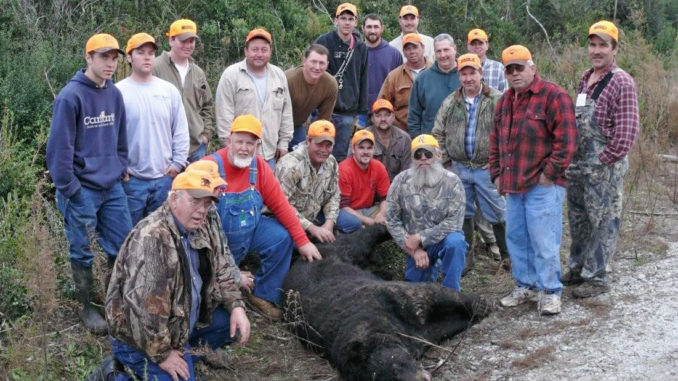
Equity of bear-baiting regulations, early bow season demanded by NCBA.
With the North Carolina Wildlife Resources Commission bringing a series of proposed changes to bear-hunting regulations to public hearings in September, the North Carolina Bowhunters Association wants a piece of the pie, so to speak.
“It’s now legal for bear dog hunters to set up a natural-food bait pile nd strike a bear on that bait and kill it 10 feet from the bait,” said Ramon Bell, NCBA’s president. “I don’t see the difference in doing that and shooting a bear over a corn pile with a bow or a gun, but that’s just my opinion. We just want some equity in the regulations. But again, NCBA has no official position on baiting.”
Bell said his group also is pushing for an earlier start for bear-hunting archers.
“(NCBA) also would like to see an early season for bear hunting with archery equipment only, he said. “We have asked for this to be considered in the past and will continue to ask that this be considered in the future, especially as bear populations continue to grow and expand statewide.”
The NCBA was apparently upset when the bear-hunting section of the North Carolina Sporting Dog Association held three meetings in August that were attended by officials with the N.C. Wildlife Resources Commission.
Notice of the meetings, held in Williamston, Beulaville and Waynesville, were sent out by the NCSDA with the names of two Commission officials – Assistant Executive Director Mallory Martin and hunter-education specialist David Denton – attached, giving the appearance that the Commission was sponsoring the meetings, which wasn’t the case.
The NCSDA organized the meetings after David Hoyle Jr., chairman of the Commission, said at his group’s July 7 meeting that agency staff would meet with bear dog hunters.
“(They) were essentially listening sessions set up to talk about issues surrounding bear hunting,” Martin said. “(The Commission) is trying to get as much information as we can. We’re trying to understand the equity problem (regarding hunting black bears).”
The Commission is trying to develop new bear-management strategies, prompted by the spread of the animals toward the middle of the state from their traditional ranges in the western mountains and along the coastal plain. The Commission is taking to public hearings proposals to open seasons in several counties and to lengthen seasons in some counties that already have a season.
The NCBA would like still hunters to be able to take bears over bait, pointing to a regulation that allows bear dogs to strike bears around natural bait piles and begin chases.
But Bell said current regulations seem to favor bear-dog hunters.
“It appears laws concerning bear hunting are written and pretty much approved according to the way bear hunters want them to be written and approved,” Bell said. “There must be some parity that provides more than just the possession of a bear tag for licensed hunters.
“With bear-hunting areas expanding almost every year, surely there could be a few days set aside for an early archery-only season for bear hunting. This could be early, before the seasons open and bear hunters start running them with dogs.”
Bell said he believed there also should be new regulations pertaining to hunters in areas of the state in which bear hunting is closed.
“Stand/still hunters also should be allowed to fill their bear tags in counties currently closed to bear hunting, if the opportunity presented itself,” he said. “Seasons in these areas could be even set during the late spring or early summer months when many bears are migrating to new and often urban areas, where they aren’t wanted.”
At the very least, the NCBA believes rules should be the same for all hunters.
“Or you could have a total no-baiting regulation: no baiting for still hunters and none for dog hunters,” Bell said. “That’d be fair to everyone.”
But major questions arise. Will black bears withstand additional pressure? Will huntable acreages be locked up further by guides and outfitters who can promise certain kills over bait for big dollars? And will lease prices climb even higher, which could drive bear hunters of modest means out of the sport?
Because the eastern part of North Carolina produces the largest black bears in the world, some observers believe the harvest might increase drastically in a few years if a bait-and-shoot regulation change occurs.
Bell contacted Gordon Myers, executive director of the Commission, who agreed to hold a series of meetings between agency staff members and interested hunters.
“We want to be sure to accommodate the desire of the public in how bear hunting should be done and continue in the state,” Martin said. “Right now we’re just looking to get information; there’s no set agenda.”
Martin, who attended the three meetings with bear dog hunters, said the consensus was they generally were satisfied with current hunting regulations for black bears in North Carolina.
“Baiting (of bears) was discussed, but what people need to understand is that the current law is done statutorily by the legislature,” he said. “If any changes were done (to current hunting regulations), it’d have to be done statutorily by the legislature.”
Estimates are that North Carolina is home to between 12,000 and 14,000 black bears. During 2010, Tarheel State hunters reported killing 2,363 bears in the state: 1,701 in the east and 662 in western counties.




Be the first to comment